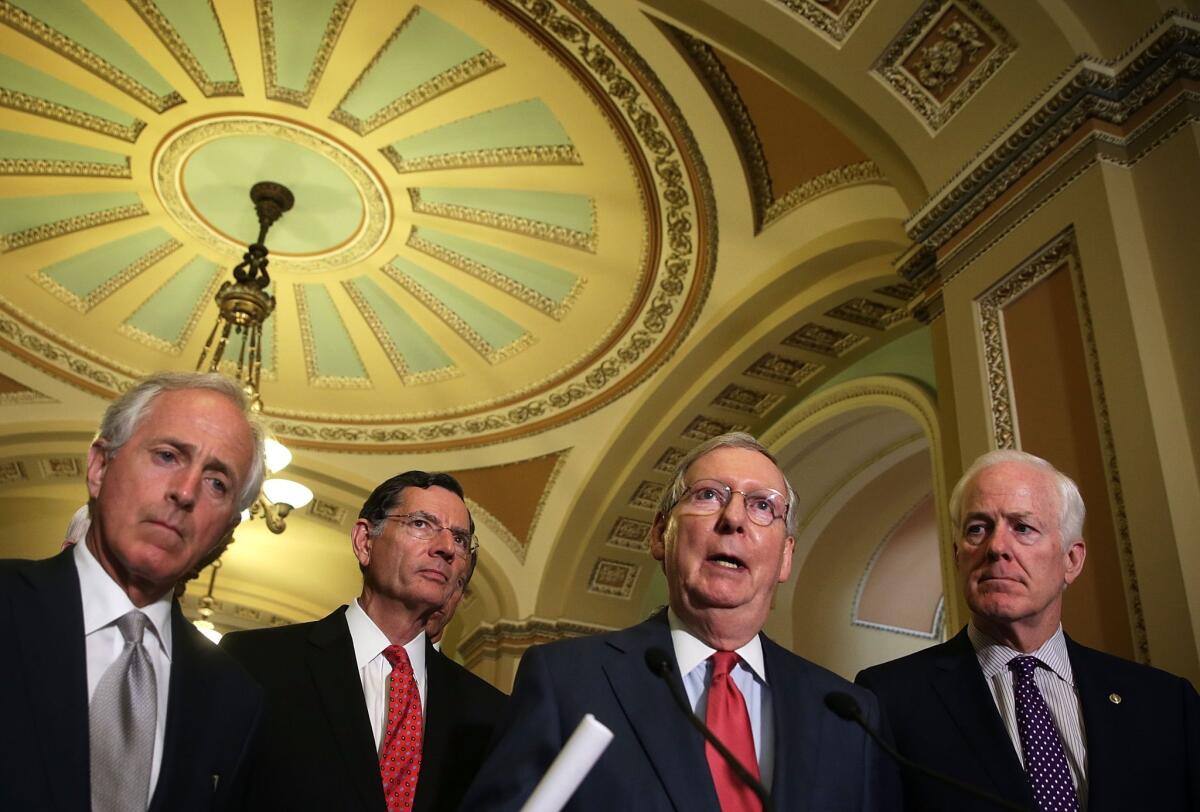Op-Ed: The danger of a ‘no’ vote on the Iran deal

From left to right, Senators Bob Corker, John Barrasso, Mitch McConnell and John Cornyn address the media on Capitol Hill on July 14. The four Republicans spoke on a variety of topics, including the Iran talks deal.
- Share via
Congress voted to rid Saddam Hussein of weapons of mass destruction that did not exist. Will it now act to block an agreement that verifiably limits Iran’s all-too-real nuclear capabilities for a decade or more? Nothing would diminish U.S. global leadership, destabilize the Middle East, further exhaust American military forces and weaken the U.S. Treasury more than this one-two punch.
A “nay” vote by Republicans against the Iran deal can have grave consequences even if they cannot override a presidential veto. Division, mostly along party lines, is never cost-free on national security issues. Countries hedge against American leadership even when U.S. foreign policies have a broad base of domestic support. They hedge more when domestic divisions convey that U.S. policies are not sustainable. Nuclear proliferation can be managed with this agreement; that becomes much harder if it unravels.
Capitol Hill has become a theatrical, partisan battleground where lawmakers can cast votes in the confident expectation of coming up short. Republicans can vote repeatedly against Obamacare without having to deal with the consequences of leaving millions of Americans without coverage because they can’t override a presidential veto or the Supreme Court. Democrats can vote in large numbers against fast-tracking the Trans-Pacific Partnership because they know the White House will still be able to cobble together a majority.
Voting against the Iran agreement is different. A deep partisan divide would send all the wrong messages to U.S. friends, allies and adversaries. What we need is a bipartisan strategy to cope with the deal’s downside risks and shore up our partners in the Middle East that will be affected by the lifting of sanctions on Iran.
Instead, Republicans are gearing up to oppose this deal, and to carry out a long campaign to block its implementation. Some sanctions covered by the deal can be lifted by executive order, others will need congressional approval. (Sanctions relating to human rights abuses and terrorist activities aren’t part of the deal.) In Senate Majority Leader Mitch McConnell’s words, Republicans will continue to send an “unmistakable signal about congressional opposition to lifting sanctions.”
If Tehran violates the provisions of this agreement, it will be responsible for its demise and any consequences that follow. If, however, Tehran abides by its obligations, critics will still accuse Iran of violating provisions that the United States and its negotiating partners wanted but failed to get. Right-wing opponents may also spin ambiguous Iranian behavior as a kind of cheating to justify repeated votes to retain sanctions. Such a strategy could unravel the deal in the future, and then Washington, not Tehran, would bear primary responsibility for its failure.
When one party lines up against an agreement of this importance, U.S. global leadership takes a major hit. America’s allies in this deal — Britain, Germany and France — and all our allies in Europe and the Pacific will be badly shaken if congressional action indicates that they cannot place trust in executive agreements reached with the United States. Beijing and Moscow will be the greatest beneficiaries of weakened confidence in U.S. leadership.
Only the governments of Israel and Saudi Arabia vociferously oppose this agreement. By seeking to undermine it, they are not acting as friends or allies. They will lose more than they will gain if this agreement unravels.
The point of sanctions has been to isolate Tehran and to set the table for an effective and verifiable nuclear limitation agreement. If Republicans block implementation of this agreement, or if they sabotage it by repeatedly voting to retain sanctions once the deal is done, Washington rather than Tehran will be isolated, tougher sanctions if they are needed in the future will be a pipe-dream, and Tehran will be off the hook.
The United States and its friends and allies will then face the worst of both worlds: an Iran that is under no obligations to limit its nuclear capabilities and that welcomes foreign investment.
This agreement reflects compromises that can be labeled as defects. They pale in comparison to the defects of a strategy to undo it. The need of the hour is to avoid a partisan divide and instead to work up a bipartisan strategy to support friends in the region.
Michael Krepon is the co-founder of the nonpartisan Stimson Center.
Follow the Opinion section on Twitter @latimesopinion and Facebook
More to Read
A cure for the common opinion
Get thought-provoking perspectives with our weekly newsletter.
You may occasionally receive promotional content from the Los Angeles Times.









